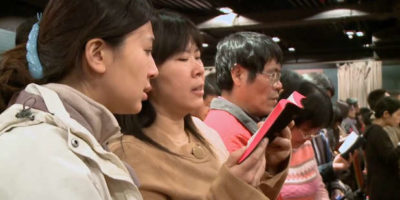Pakistan plays down accusations of Christian persecution. Foreign minister says.

Pakistan’s foreign minister has sought to dismiss accusations of Christian persecution, claiming there were “individual incidents” comparable to knife crime in the UK.
Shah Mahmood Qureshi, speaking during a visit to Brussels, said reports of religious minorities being targeted in Pakistan did not constitute a trend and the recent claims of Christian persecution were an example of “western interests” that “want to paint Pakistan in a particular way”.
His comments follow the international outcry sparked by the case of Asia Bibi, a Pakistani Christian woman who spent eight years on death row on a charge of blasphemy, which was later overturned, before being allowed to leave for Canada.
Asked about reports of Pakistan’s 2.5 million Christians being attacked or facing persecution under the country’s blasphemy laws, Qureshi said: “You can’t say this is a trend, no. Individual incidents can be quoted anywhere, [of] minorities being mistreated here, in Europe, in Britain.”
He pointed to the UK’s own problems after the fatal stabbings of four people in four days put London’s knife crime in the international spotlight last week.
“I can quote you examples of how knife crime has gone up in Britain that is a clear reflection of an increased intolerance within a society which has been so tolerant, so accommodating. So there are examples over here, and there could be some examples over there,” Qureshi said.
“But I can assure you that Christians are very welcome. The Christian community in Pakistan is very positive and a very responsible community … We respect them and we want them to be there. We will do everything possible to protect them and we are.”
Qureshi, who met Jeremy Hunt, the UK foreign secretary and Tory leadership hopeful, last week in London before his visit to Brussels to meet EU leaders, went on to criticise Boris Johnson, the frontrunner in the contest to be the next British prime minister, for his comments describing veiled Muslim women as looking like a “letter box”.
“It is a faux pas,” Qureshi said. “It will certainly not help in many constituencies where Muslims have a swing vote so he should be cognisant of that.”
He added: “I think Britain today is a very divided house. I see after the referendum the argument hasn’t settled. It is a very hot topic. There is talk of a fresh referendum and that means there is a large section of British society that feels they have made a mistake and want to revisit the decision. Who knows what will happen? It is too early to pass judgment.”
Of Brexit, he said: “It will certainly not help Britain in any way.”
The Centre for Social Justice thinktank has said that between 1987 and 2017 more than 1,500 people, mainly Christian or members of the Ahmadi Muslim minority, were charged with blasphemy.
Accusations of the crime have also led to mob violence and it has been claimed that despite a police crackdown the scale of the recently revealed trafficking of Christian Pakistani women to men in China had been suppressed to avoid damaging relations with Beijing.
Pakistan, whose economy has stalled, recently received about $3.5bn (£2.75bn) in loans and grants from the Chinese government.
“Nobody wants any law to be misused and we are against misuse of anything,” Qureshi said of the blasphemy law.
He said Pakistan and China had investigated the allegations of Pakistani women being trafficked to China, but found the “stories had no truth to them”. He added that as a policy Pakistan would “never tolerate that”.
… we have a small favour to ask. More people, like you, are reading and supporting the Guardian’s independent, investigative journalism than ever before. And unlike many news organisations, we made the choice to keep our reporting open for all, regardless of where they live or what they can afford to pay.
Whether we are up close or further away, the Guardian brings our readers a global perspective on the most critical issues of our lifetimes – from the escalating climate catastrophe to widespread inequality to the influence of big tech on our lives. We believe complex stories need context in order for us to truly understand them. At a time when factual information is a necessity, we believe that each of us, around the world, deserves access to accurate reporting with integrity at its heart.
Our editorial independence means we set our own agenda and voice our own opinions. Guardian journalism is free from commercial and political bias and not influenced by billionaire owners or shareholders. This means we can give a voice to those less heard, explore where others turn away, and rigorously challenge those in power.
We hope you will consider supporting us today. We need your support to keep delivering quality journalism that’s open and independent. Every reader contribution, however big or small, is so valuable.












Comments are Closed